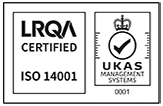Having a Site Waste Management Plan (SWMP) is a proactive step toward implementing measures to reduce, reuse and recycle construction site waste in order to support more sustainable resource management.
This blog will delve into the intricacies of implementing a SWMP, placing emphasis on its legal obligations, the myriad of advantages it offers to both your clients and your firm, and providing a comprehensive, step-by-step guide on formulating one.
What is a site waste management plan?
Essentially a SWMP defines how commercial waste materials generated during construction or demolition are to be managed efficiently on site and disposed of in an environmentally responsible manner. It should also maximise opportunities to re-use and recycle materials.
The site waste management plan is prepared before construction begins and involves estimating the type and amount of waste that is likely to be produced, as well as the proportion that will be re-used or recycled on site, or removed from the site for re-use, recycling, recovery or disposal.
Are site waste management plans still required?
In 2008, England introduced The Site Waste Management Plan Regulations, aiming to compel construction projects with an estimated cost of £300,000 or more to develop a site waste management plan. Failure to have such a plan in place at the start of a project would render both the client and the principal contractor liable for an offence under this regulation.
In 2013, this Regulation was revoked by the government in order to reduce administrative burden on businesses, and SWMPs were no longer a legal requirement in England for construction projects.
The focus has shifted to upholding the Waste Duty of Care Code of Practice, under Section 34 of the 1990 Environmental Protection Act, and raising awareness of the many benefits having a SWMP has to offer. The Code applies to ‘anyone dealing with waste to keep it safe, make sure it’s dealt with responsibly and only given to businesses authorised to take it’. The code aims to ensure all parties involved take all responsible measures to meet their duty of care with regards to site waste management. Failure to comply can result in prosecution and, on conviction, a fine and a resulting criminal record.
|
Looking for waste management professionals for your upcoming construction project? |
What are the benefits of a SWMP?
For construction firms, clients and the environment, there are a myriad of benefits to adopting a site waste management plan for construction and demolition projects. These include:
- Environmental protection – a SWMP helps mitigate the environmental impact of construction and demolition, conserving natural resources and reducing greenhouse gas emissions.
- Protection of valuable resources – having a plan reduces the need to extract more resources through efficient recycling and reusing.
- Cost savings – a site waste management plan minimises waste disposal costs by reducing waste, reusing materials and recycling initiatives.
- Improved efficiency – planning for waste management in advance streamlines processes, reduces material surplus and delays caused by waste handling and disposal issues.
- Legal compliance – having a site waste management plan ensures that construction firms and clients comply with relevant regulations and standards, thereby reducing the risk of fines, penalties and legal liabilities associated with potentially illegal waste management practices.
- Marketing opportunities – demonstrating a commitment to sustainable construction practices through the implementation of a SWMP can improve the reputation of construction firms, attract environmentally-conscious clients and differentiate themselves from direct competitors.
- Risk control – proper waste management practices outlined in a SWMP reduce the risk of accidents, injuries and health hazards associated with poor waste handling, promoting a safer work environment for workers and stakeholders.
How to create a comprehensive site waste management plan
The formulation of a site waste management plan typically involves collaboration among various stakeholders involved in a construction project, such as your client or project owner, the principal contractor, the design team, waste management professionals such as Rabbit Skips, and seeking guidance from local authorities and environmental regulators.
The following step-by-step guide outlines how to create an extensive SWMP for your next project:
Step 1. Identity and classify waste: This involves identifying the types and quantities of waste expected to be generated during the project.
Step 2. Devise waste minimisation strategies: These are methods for reducing the amount of waste generated, such as careful material selection, efficient use of resources, and design modifications to reduce excess waste. Applying the ‘Four Rs’ ensures that everything is considered:
- Reuse – later in the project or on future projects
- Recycle – for example, crushing material from the demolition stage of a project to use as aggregate
- Recover – items such as bricks and non-ferrous material
- Remove – send to landfill
Step 3. Assign responsibilities and roles: A site waste management plan should assign responsibilities to individuals or teams for implementing and managing waste management practices on the site, and who is responsible for disposing of waste after it has left site.
Step 4. Documentation and monitoring: Once construction begins, careful and continual recording of waste handling both on and off-site must be carried out.
Step 5. Evaluation: Assess waste removal activities for areas of improvement while maximising the profitability of your waste handling.
Consulting a waste management service provider
The aim of a site waste management plan is to minimise the environmental impact of construction and demolition activities by reducing waste sent to landfill, conserving resources, and promoting sustainable practices. It also helps contractors comply with waste management regulations and may contribute to cost savings by optimising material use and reducing disposal fees. During the development of your site waste management plan, contracting the services of a comprehensive waste management service ensures access to the latest and most compliant waste management techniques. Additionally, partnering with a waste management service provider capable of converting your waste into green energy guarantees responsible waste disposal.
Rabbit & Dowling Plant Hire is an established and expert supplier of plant hire for commercial and domestic building projects throughout Sussex, Surrey and Hampshire.
To find out more about Rabbit & Dowling Plant Hire’s plant hire services contact our expert and friendly team on 01903 851957 or info@rabbitanddowling.co.uk.
Rabbit & Dowling Plant Hire is part of The Rabbit Group of companies, which includes Rabbit Demolition, Rabbit Skip Hire and Rabbit Toilet Hire.





